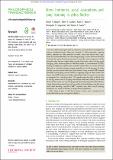Files in this item
Stress hormones, social associations and song learning in zebra finches
Item metadata
| dc.contributor.author | Boogert, Neeltje J. | |
| dc.contributor.author | Lachlan, Robert F. | |
| dc.contributor.author | Spencer, Karen A | |
| dc.contributor.author | Templeton, Christopher N | |
| dc.contributor.author | Farine, Damien R | |
| dc.date.accessioned | 2018-08-16T10:30:06Z | |
| dc.date.available | 2018-08-16T10:30:06Z | |
| dc.date.issued | 2018-09-26 | |
| dc.identifier | 255399636 | |
| dc.identifier | 87d0b2ad-62f4-4644-b639-ae1af1c706dd | |
| dc.identifier | 30104435 | |
| dc.identifier | 85052492532 | |
| dc.identifier | 000441443800011 | |
| dc.identifier.citation | Boogert , N J , Lachlan , R F , Spencer , K A , Templeton , C N & Farine , D R 2018 , ' Stress hormones, social associations and song learning in zebra finches ' , Philosophical Transactions of the Royal Society. B, Biological Sciences , vol. 373 , no. 1756 , 20170290 . https://doi.org/10.1098/rstb.2017.0290 | en |
| dc.identifier.issn | 0962-8436 | |
| dc.identifier.other | ORCID: /0000-0002-2851-9379/work/78205009 | |
| dc.identifier.uri | https://hdl.handle.net/10023/15830 | |
| dc.description | N.J.B. was funded by a Netherlands Organisation for Scientific Research Rubicon Fellowship during the experimental phase of this study and by a Royal Society Dorothy Hodgkin Fellowship during the write-up. K.A.S. was funded by a BBSRC David Phillips Research Fellowship during the experimental phase. C.N.T. was supported by an NERC Postdoctoral Fellowship during the experimental phase of the study. D.R.F. was funded by the Max Planck Society and received additional funding from the Deutsche Forschungsgemeinschaft (FA 1420/4-1). | en |
| dc.description.abstract | The use of information provided by others is a common short-cut adopted to inform decision-making. However, instead of indiscriminately copying others, animals are often selective in what, when and whom they copy. How do they decide which 'social learning strategy' to use? Previous research indicates that stress hormone exposure in early life may be important: while juvenile zebra finches copied their parents' behaviour when solving novel foraging tasks, those exposed to elevated levels of corticosterone (CORT) during development copied only unrelated adults. Here, we tested whether this switch in social learning strategy generalizes to vocal learning. In zebra finches, juvenile males often copy their father's song; would CORT-treated juveniles in free-flying aviaries switch to copying songs of other males? We found that CORT-treated juveniles copied their father's song less accurately as compared to control juveniles. We hypothesized that this could be due to having weaker social foraging associations with their fathers, and found that sons that spent less time foraging with their fathers produced less similar songs. Our findings are in line with a novel hypothesis linking early-life stress and social learning: early-life CORT exposure may affect social learning indirectly as a result of the way it shapes social affiliations. This article is part of the theme issue 'Causes and consequences of individual differences in cognitive abilities'. | |
| dc.format.extent | 9 | |
| dc.format.extent | 603637 | |
| dc.language.iso | eng | |
| dc.relation.ispartof | Philosophical Transactions of the Royal Society. B, Biological Sciences | en |
| dc.subject | Developmental stress | en |
| dc.subject | Information use | en |
| dc.subject | Social networks | en |
| dc.subject | Social learning | en |
| dc.subject | Song learning | en |
| dc.subject | Stress hormones | en |
| dc.subject | BF Psychology | en |
| dc.subject | QL Zoology | en |
| dc.subject | DAS | en |
| dc.subject.lcc | BF | en |
| dc.subject.lcc | QL | en |
| dc.title | Stress hormones, social associations and song learning in zebra finches | en |
| dc.type | Journal article | en |
| dc.contributor.sponsor | NERC | en |
| dc.contributor.institution | University of St Andrews. School of Psychology and Neuroscience | en |
| dc.contributor.institution | University of St Andrews. School of Biology | en |
| dc.identifier.doi | https://doi.org/10.1098/rstb.2017.0290 | |
| dc.description.status | Peer reviewed | en |
| dc.identifier.grantnumber | NE/J018694/1 | en |
This item appears in the following Collection(s)
Items in the St Andrews Research Repository are protected by copyright, with all rights reserved, unless otherwise indicated.

